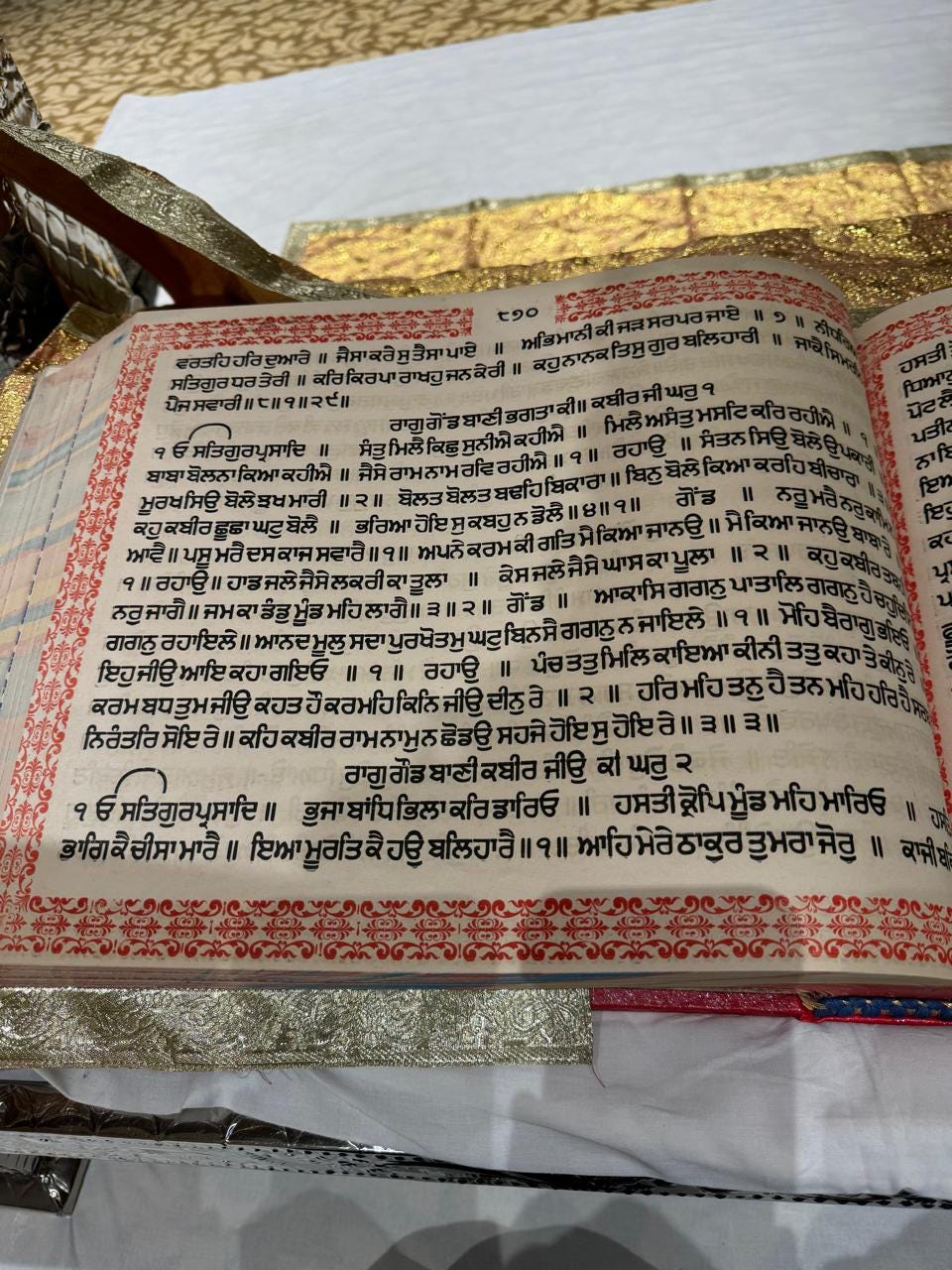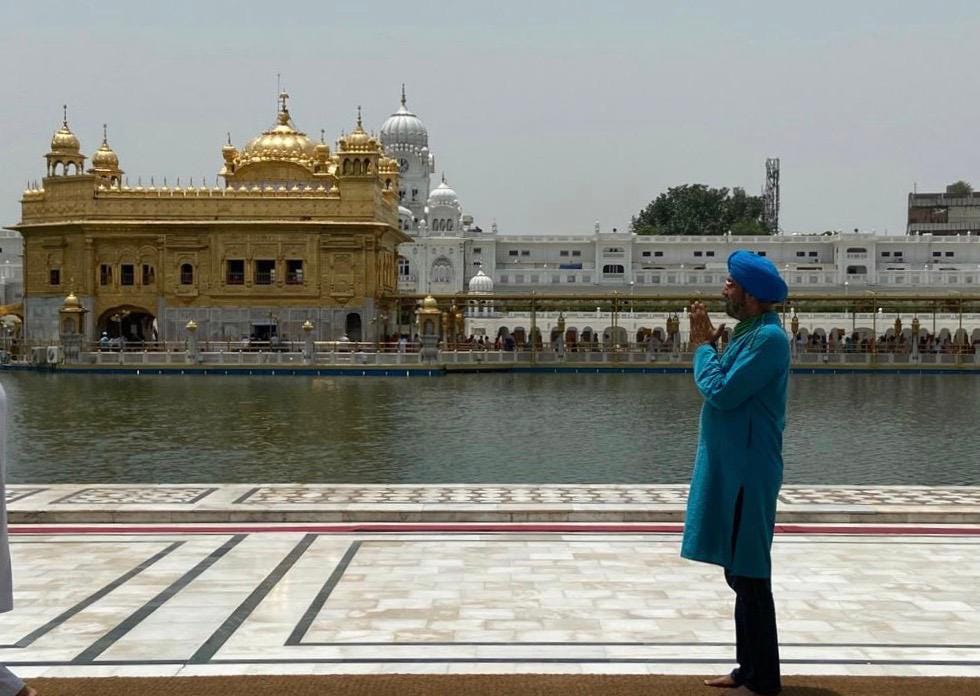Bhagat Kabir Ji on the Power of Speech, Life, Death, and Spiritual Wisdom in Sri Guru Granth Sahib
Invaluable Verses of Bhagat Kabir ji
The verses of Bhagat Kabir Ji, as captured on page 870 of the Sri Guru Granth Sahib, offer a timeless reflection on the power of speech, the nature of life and death, and the journey toward spiritual wisdom. Bhagat Kabir Ji, known for his profound yet straightforward style, teaches us how speech can uplift or degrade us, how life and death hold deep mysteries, and how the body and soul are connected with the Divine. In this shabad, set in Raag Gond, Kabir Ji presents practical lessons on discerning speech, the impermanence of the body, and the omnipresence of God.
Raag Gond in the context of these verses
Raag Gond is a classical musical mode that is featured in Sri Guru Granth Sahib to invoke a particular emotional and spiritual state. Typically, Raag Gond is recited during the late morning hours, between 9 AM to 12 PM. The mood created by this raag is one of deep devotion, humility, and introspection. It is employed to express a heartfelt plea for guidance, a yearning for union with the Divine, and to facilitate contemplation of life’s profound truths. The gentle and reflective nature of Raag Gond encourages a sense of inner calm and openness to spiritual understanding.
Within the context of these verses by Bhagat Kabir Ji, Raag Gond enhances the reflective and meditative nature of the shabad. The raag’s calming and introspective tone helps to reinforce the themes of silence, wisdom, the impermanence of life, and the omnipresence of the Divine. It invites the listener or reciter to turn inward, reflect on their own actions, speech, and the deeper mysteries of life and death. This raag, with its soothing cadence, creates an emotional space where one can connect with the message of humility, surrender, and the constant remembrance of God's name, which is central to Kabir Ji’s teachings in these verses.
Exploring these Verses
Let us explore each verse with its meaning and reflect on its relevance in our lives.
ਰਾਗੁ ਗੋਂਡ ਬਾਣੀ ਭਗਤਾ ਕੀ ॥
रागु गोंड बाणी भगता की ॥
Rāg gond baṇī bẖagṯā kī.
In Raag Gond, the Word of the Devotees.
This line sets the tone for the composition, introducing it as the words of devotees who share their divine wisdom.
ਕਬੀਰ ਜੀ ਘਰੁ ੧
कबीर जी घरु १
Kabīr jī gẖar 1
Kabir Ji, First House:
This composition is structured in the First House, a classical measure, giving it a musical and rhythmic flow.
ੴ ਸਤਿਗੁਰ ਪ੍ਰਸਾਦਿ ॥
ੴ सतिगुर प्रसादि ॥
Ik▫oaʼnkār saṯgur parsāḏ.
One Universal Creator God. By the Grace of the True Guru:
This invocation reminds us of the One Creator and the grace that flows through the True Guru, which leads to divine understanding.
ਸੰਤੁ ਮਿਲੈ ਕਿਛੁ ਸੁਨੀਐ ਕਹੀਐ ॥
संतु मिलै किछु सुनीऐ कहीऐ ॥
Sanṯ milai kicẖẖ sunī▫ai kahī▫ai.
When you meet a Saint, talk to him and listen.
Kabir Ji starts by encouraging dialogue with saints. When we encounter saintly people, we should speak and listen, learning from their wisdom.
ਮਿਲੈ ਅਸੰਤੁ ਮਸਟਿ ਕਰਿ ਰਹੀਐ ॥੧॥
मिलै असंतु मसटि करि रहीऐ ॥१॥
Milai asanṯ masat kar rahī▫ai. ||1||
When meeting an unsaintly person, remain silent. ||1||
On the other hand, when faced with the company of an unwise or immoral person, silence is the best option, as their influence may be harmful.
ਬਾਬਾ ਬੋਲਨਾ ਕਿਆ ਕਹੀਐ ॥
बाबा बोलना किआ कहीऐ ॥
Bābā bolnā ki▫ā kahī▫ai.
O father, what words should I speak?
Kabir Ji contemplates the significance of words, questioning what should be spoken and what should remain unsaid.
ਜੈਸੇ ਰਾਮ ਨਾਮ ਰਵਿ ਰਹੀਐ ॥੧॥ ਰਹਾਉ ॥
जैसे राम नाम रवि रहीऐ ॥१॥ रहाउ ॥
Jaise rām nām rav rahī▫ai. ||1|| rahā▫o.
Speak in such a way that you remain absorbed in the Name of the Lord. ||1||Pause||
He concludes that one should speak in a way that deepens one’s connection with the Divine, focusing on words that lead to the remembrance of God.
ਸੰਤਨ ਸਿਉ ਬੋਲੇ ਉਪਕਾਰੀ ॥
संतन सिउ बोले उपकारी ॥
Sanṯan si▫o bole upkārī.
Speaking with saints brings goodness and virtue.
When conversing with saints, one becomes benevolent and virtuous, as their wisdom elevates us.
ਮੂਰਖ ਸਿਉ ਬੋਲੇ ਝਖ ਮਾਰੀ ॥੨॥
**मूरख सिउ बोले झख मारी ॥२॥
Mūrakẖ si▫o bole jẖakẖ mārī. ||2||
Speaking with a fool is futile and frustrating. ||2||
In contrast, engaging in dialogue with a fool is fruitless, as it leads to frustration and wasted energy.
ਬੋਲਤ ਬੋਲਤ ਬਢਹਿ ਬਿਕਾਰਾ ॥
बोलत बोलत बढहि बिकारा ॥
Bolaṯ bolaṯ badẖėh bikārā.
By constantly speaking, corruption increases.
Kabir Ji warns that too much talking, especially without purpose, only leads to vices and corruption.
ਬਿਨੁ ਬੋਲੇ ਕਿਆ ਕਰਹਿ ਬੀਚਾਰਾ ॥੩॥
**बिनु बोले किआ करहि बीचारा ॥३॥
Bin bole ki▫ā karahi bīcẖārā. ||3||
If one does not speak, what can a poor person do? ||3||
However, silence too has its limits. Kabir Ji questions how one can convey truth or express oneself without speaking.
ਕਹੁ ਕਬੀਰ ਛੂਛਾ ਘਟੁ ਬੋਲੈ ॥
कहु कबीर छूछा घटु बोलै ॥
Kaho Kabīr cẖẖūcẖẖā gẖat bolai.
Says Kabir, the empty vessel makes the most noise,
He compares meaningless speech to an empty vessel making noise. Often, those with little substance speak the loudest.
ਭਰਿਆ ਹੋਇ ਸੁ ਕਬਹੁ ਨ ਡੋਲੈ ॥੪॥੧॥
भरिआ होइ सु कबहु न डोलै ॥४॥१॥
Bẖari▫ā ho▫e so kabahu na dolai. ||4||1||
But a vessel that is full of knowledge and wisdom does not waver. ||4||1||
In contrast, a person filled with wisdom remains calm and steady, not prone to making unnecessary noise.
ਨਰੂ ਮਰੈ ਨਰੁ ਕਾਮਿ ਨ ਆਵੈ ॥
नरू मरै नरु कामि न आवै ॥
Narū marai nar kām na āvai.
When a person dies, they are of no further use.
Kabir Ji transitions to the subject of life and death, stating that when a person dies, they no longer serve any practical purpose.
ਪਸੂ ਮਰੈ ਦਸ ਕਾਜ ਸਵਾਰੈ ॥੧॥
**पसू मरै दस काज सवारै ॥१॥
Pasū marai ḏas kāj savārai. ||1||
When an animal dies, it is useful in ten ways. ||1||
He compares human death to the death of an animal, which can still serve many purposes even after its demise.
ਅਪਨੇ ਕਰਮ ਕੀ ਗਤਿ ਮੈ ਕਿਆ ਜਾਨਉ ॥
अपने करम की गति मै किआ जानउ ॥
Apne karam kī gaṯ mai ki▫ā jān▫o.
What do I know of the state of my own karma?
Kabir Ji humbly admits that he does not know the state of his karma, questioning the deeper mystery of one’s actions and their consequences.
ਮੈ ਕਿਆ ਜਾਨਉ ਬਾਬਾ ਰੇ ॥੧॥ ਰਹਾਉ ॥
मै किआ जानउ बाबा रे ॥१॥ रहाउ ॥
Mai ki▫ā jān▫o bābā re. ||1|| rahā▫o.
What do I know, O Baba? ||1||Pause||
This reflects Kabir Ji’s humility and sense of awe at the workings of the universe, as he acknowledges his limited understanding.
ਹਾਡ ਜਲੇ ਜੈਸੇ ਲਕਰੀ ਕਾ ਤੂਲਾ ॥
हाड जले जैसे लकरी का तूला ॥
Hād jale jaise lakrī kā ṯūlā.
His bones burn like a bundle of wood.
Kabir Ji paints a vivid picture of death, describing how the body burns like wood upon death.
ਕੇਸ ਜਲੇ ਜੈਸੇ ਘਾਸ ਕਾ ਪੂਲਾ ॥੨॥
**केस जले जैसे घास का पूला ॥२॥
Kes jale jaise gẖās kā pūlā. ||2||
The hair burns like a bundle of hay. ||2||
Similarly, the hair burns away like dry grass, highlighting the impermanence of the body.
ਕਹੁ ਕਬੀਰ ਤਬ ਹੀ ਨਰੁ ਜਾਗੈ ॥
कहु कबीर तब ही नरु जागै ॥
Kaho Kabīr ṯab hī nar jāgai.
Says Kabir, a person wakes up
Kabir Ji remarks that people often only wake up to the reality of life and death when faced with death itself.
ਜਮ ਕਾ ਡੰਡੁ ਮੂੰਡ ਮਹਿ ਲਾਗੈ ॥੩॥੨॥
**जम का डंडु मूंड महि लागै ॥३॥२॥
Jam kā dand mūnd mėh lāgai. ||3||2||
When the Messenger of Death strikes them on the head with his club. ||3||2||
It is only when death is imminent, like a blow to the head, that one begins to contemplate life’s deeper truths.
ਆਕਾਸਿ ਗਗਨੁ ਪਾਤਾਲਿ ਗਗਨੁ ਹੈ ਚਹੁ ਦਿਸਿ ਗਗਨੁ ਰਹਾਇਲੇ ॥
आकासि गगनु पातालि गगनु है चहु दिसि गगनु रहाइले ॥
Ākās gagan pāṯāl gagan hai cẖahu ḏis gagan rahā▫ile.
The Celestial Lord exists in the sky, the underworld, and all directions.
Kabir Ji moves into the omnipresence of the Divine, stating that God is everywhere — in the heavens, the underworld, and all four directions.
ਆਨਦ ਮੂਲੁ ਸਦਾ ਪੁਰਖੋਤਮੁ ਘਟੁ ਬਿਨਸੈ ਗਗਨੁ ਨ ਜਾਇਲੇ ॥੧॥
आनद मूलु सदा पुरखोतमु घटु बिनसै गगनु न जाइले ॥१॥
Ānaḏ mūl saḏā purkẖoṯam gẖat binsai gagan na jā▫ile. ||1||
The Supreme Lord is the source of eternal bliss. When the body perishes, the soul does not.
The body may perish, but the Celestial Lord remains untouched, as He is the source of eternal bliss.
ਮੋਹਿ ਬੈਰਾਗੁ ਭਇਓ ॥
मोहि बैरागु भइओ ॥
Mohi bairāg bẖa▫i▫o.
I have become detached.
Kabir Ji expresses his state of detachment, realising the impermanence of the body and the world.
ਇਹੁ ਜੀਉ ਆਇ ਕਹਾ ਗਇਓ ॥੧॥ ਰਹਾਉ ॥
इहु जीउ आइ कहा गइओ ॥१॥ रहाउ ॥
Ih jī▫o ā▫e kahā ga▫i▫o. ||1|| rahā▫o.
Where has this soul come from, and where has it gone? ||1||Pause||
He reflects on the soul’s journey, wondering about its origin and destination, as it transcends the physical body.
ਪੰਚ ਤਤੁ ਮਿਲਿ ਕਾਇਆ ਕੀਨੑੀ ਤਤੁ ਕਹਾ ਤੇ ਕੀਨੁ ਰੇ ॥
पंच ततु मिलि काइआ कीन्ही ततु कहा ते कीनु रे ॥
Pancẖ ṯaṯ mil kā▫i▫ā kīnĥī ṯaṯ kahā ṯe kīn re.
The body is formed from the five elements; but where were these elements created?
Kabir Ji ponders the mystery of creation, wondering where the five elements (earth, water, fire, air, and ether) that form the body originated.
ਕਰਮ ਬਧ ਤੁਮ ਜੀਉ ਕਹਤ ਹੌ ਕਰਮਹਿ ਕਿਨਿ ਜੀਉ ਦੀਨੁ ਰੇ ॥੨॥
**करम बध तुम जीउ कहत हौ करमहि किनि जीउ दीनु रे ॥२॥
Karam baḏẖ ṯum jī▫o kahaṯ hou karmėh kin jī▫o ḏīn re. ||2||
You say the soul is bound by karma, but who gave the soul to karma? ||2||
Kabir Ji challenges the understanding of karma, asking who gave life to karma itself and how the soul became entangled in it.
ਹਰਿ ਮਹਿ ਤਨੁ ਹੈ ਤਨ ਮਹਿ ਹਰਿ ਹੈ ਸਰਬ ਨਿਰੰਤਰਿ ਸੋਇ ਰੇ ॥
हरि महि तनु है तन महि हरि है सरब निरंतरि सोइ रे ॥
Har mėh ṯan hai ṯan mėh har hai sarab niranṯar so▫e re.
The body is in God, and God is in the body. He is present in everything.
Kabir Ji reminds us of the omnipresence of God — the Divine resides within the body and permeates everything in existence.
ਕਹਿ ਕਬੀਰ ਰਾਮ ਨਾਮੁ ਨ ਛੋਡਉ ਸਹਜੇ ਹੋਇ ਸੁ ਹੋਇ ਰੇ ॥੩॥੩॥
कहि कबीर राम नामु न छोडउ सहजे होइ सु होइ रे ॥३॥३॥
Kahi Kabīr rām nām na cẖẖoda▫o sėhje ho▫e so ho▫e re. ||3||3||
Says Kabir, I will not forsake the Lord’s Name. Whatever happens will happen naturally. ||3||3||
In the final verse, Kabir Ji declares his unwavering devotion to the Name of the Lord. He surrenders to the natural flow of life, accepting whatever comes his way with grace.
Summing Up
Bhagat Kabir Ji’s verses from page 870 of the Sri Guru Granth Sahib delve deep into the nature of speech, life, death, and spirituality. Kabir Ji reminds us that speaking wisely and associating with the wise leads to spiritual upliftment, while idle talk leads to corruption. His reflections on life and death, the body and soul, and the omnipresence of the Divine encourage us to live a life of humility, understanding the fleeting nature of the physical world while staying rooted in the eternal truth of God’s presence. Ultimately, Kabir Ji’s message is one of balance, where we speak only when necessary, remain silent when needed, and maintain a steady connection with the Divine at all times.





